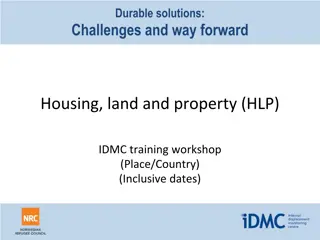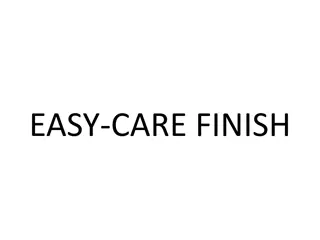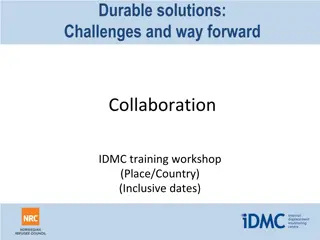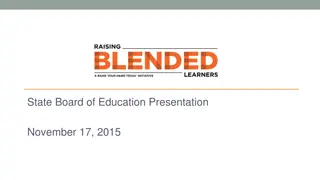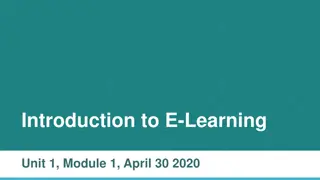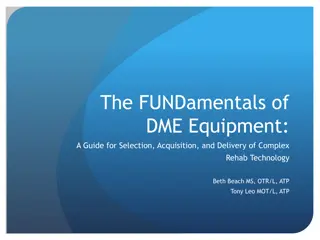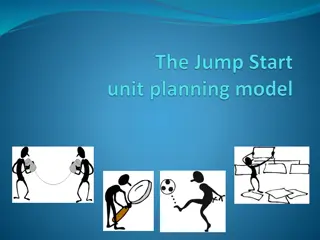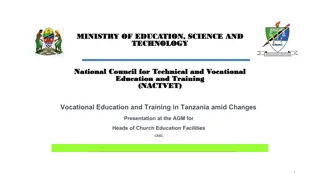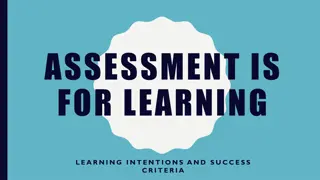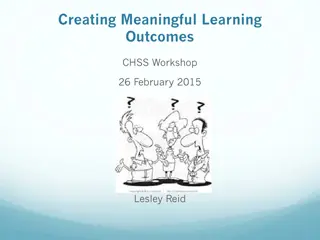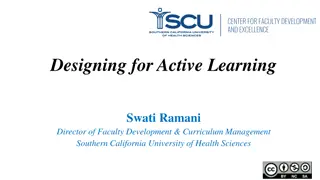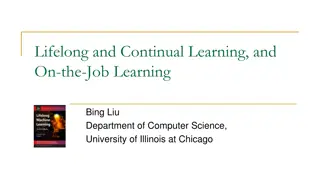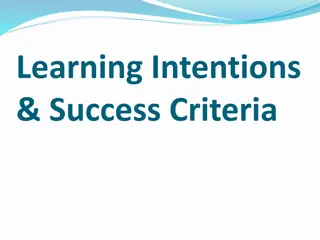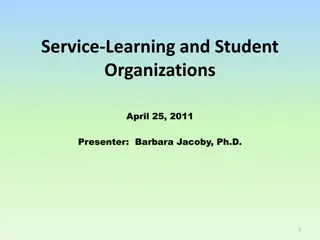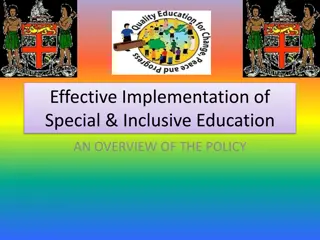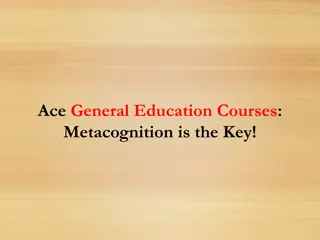Enhancing Durable Learning Strategies for Effective Education
Explore the challenges and evidence-based strategies to promote durable learning highlighted in a symposium led by Amanda Maknyik, MEd Manager at Durham College. Learn about the importance of motivation, sustained attention, and relevance in achieving lasting learning outcomes. Discover how spaced practice, interleaving, and reinforcing techniques contribute to improved memory retention and comprehension in educational settings.
Download Presentation

Please find below an Image/Link to download the presentation.
The content on the website is provided AS IS for your information and personal use only. It may not be sold, licensed, or shared on other websites without obtaining consent from the author. Download presentation by click this link. If you encounter any issues during the download, it is possible that the publisher has removed the file from their server.
E N D
Presentation Transcript
SCWI Symposium: Supporting Durable Learning Amanda Maknyik, MEd Manager, Educational Development Durham College CTL
What words come to mind when you think about Durable Learning? Poll 1
What words come to mind when you think about Durable Learning?
Review: Memory and Learning Memories tend to be created in ways that fit our existing schema. Memories are altered and affected by additional information linked to that memory. There are 2 primary types of memory: short-term (immediate recall) long-term(storage & retrieval) this is our target when teaching All images licensed under CC0 1.0 Universal (CC0 1.0) Public Domain Dedication
signature_2092960543 Challenges with Durable Learning Challenges with Durable Learning Content without purpose is only trivia. Steve Revington 1. Lack of relevance/not meaningful 2. Foggy connections 3. Disinterest or disengagement 4. Dwindling motivation 5. Compromised attention & focus 6. Lack of practice 7. Teacher influence Head image licensed under CC0 1.0 Universal (CC0 1.0) Public Domain Dedication
signature_2092960543 Evidence Based Strategies to Promote Durable Learning There are 3 primary pieces required to effectively put together the learning "puzzle": 1. Motivation 2. Sustained attention 3. Meaning/relevance Head image licensed under CC0 1.0 Universal (CC0 1.0) Public Domain Dedication
signature_2092960543 Preparing for Learning Preparing for Learning 1. Spaced Practice 2. Interleaving "Having multiple opportunities to study or practice something at distinct time-points."2 "Switching between ideas or problem types while studying."2 ADVANTAGES: Promotes retrieval of the correct strategy to respond to a question; Better differentiation between concepts; ADVANTAGES: Repeated checks for understanding; Improves "storage" strength. Example: Providing questions, or opportunities to practice, in a combined format, rather than 1 question type at a time. Examples: 1. Giving a quiz at the end of a lesson, and a quick quiz on the lesson the next day/week. 2. Studying at set intervals for weeks before an exam.
signature_2092960543 Reinforcing Learning Reinforcing Learning 1. Elaboration 2. Concrete Examples "Adding details to memories and integrating new information with existing knowledge."2 ADVANTAGES: new and prior knowledge/information; understanding; "Specific stories, pictures, analogies, and other items that illustrate abstract ideas."2 ADVANTAGES: understand, concept with prior knowledge that has understood meaning. Facilitates connection & integration of Connects an abstract, or difficult to Promotes deep processing & Examples: Example: Discussing real world examples of how that concept is seen/worked with/demonstrated. CAUTION: Focus on the example, rather than the concept. 1. "Elaborative Interrogation" - asking "why" and "how" questions. 2. Describing a process or solution to oneself while writing/solving.
signature_2092960543 Anchoring Learning Anchoring Learning 1. Dual Coding "Combining words with visuals."2 ADVANTAGES: Provides 2 ways of remembering; Examples: 1. Mind mapping; 2. Using a graphic organizer; 3. Illustrating a concept or process. 4. Mnemonics CAUTION: Too many words + visuals can result in cognitive overload (required processing exceeds capacity). Mind Map image Attribution 2.0 Generic (CC BY 2.0) retrieved from How to Mind Map | . blog.iqmatrix.com/mind-map-image-gallery | Pietro Zanarini | Flickr; cell worksheets retrieved from Animal Cell Worksheet - Superstar Worksheets
signature_2092960543 Anchoring Learning Anchoring Learning 2. Retrieval Practice "Bringing learned information to mind from long term memory."2 ADVANTAGES: memory; not, known/understood. Improves learning by strengthening Provides feedback on what is, and is Examples: 1. Application activities (doing, writing, drawing, telling); 2. Providing a graphic organizer to complete; 3. Frequent small, low-stakes quizzes ahead of a test. Head image licensed under CC0 1.0 Universal (CC0 1.0) Public Domain Dedication retrieved from Pixaby.com; Cell worksheets retrieved from Animal Cell Worksheet - Superstar Worksheets
signature_2092960543 Authentic Learning Activities What is it? An instructional approach that allows students to explore, discuss, and meaningfully construct concepts and relationships in contexts that involve real-world problems and projects that are relevant to the learner. (Donovan, Bransford, & Pellegrino, 1999) Student Centered Provides choice Activates intrinsic reward system Tasks & criteria are known Creative & connective Engaging & Meaningful Balances easy and challenging tasks Relevant: clear connection to self Constructive Feedback is meaningful & timely Integrative Role expectations with academic requirements Knowledge with skills Analysis with creativity CLOs with EESs
Image licensed under CC0 1.0 Universal (CC0 1.0) Public Domain Dedication; retrieved from www.freesvg.org signature_2092960543 What Might an Authentic Activity look like? Present a new thing & have them investigate and explain how it works using learned principles 1. Real life relevance 2. Poorly defined problem 3. Sustained investigation 4. Leverages multiple resources & perspectives 5. Multiple interpretations & outcomes 6. Collaborative (+/-) 7. Reflective Create a team and complete a task based on specified roles and responsibilities Consider & pose a novel solution for a real world problem Create an audio/video response to a question/scenario Explore a case study using learned concepts and professional resources Design/build something new using learned principles (Lombardi, 2007) Any simulation-based activity or game
signature_2092960543 Active Learning Strategies Benefits of Active Learning: Allows for deeper engagement through exploration of content Encourages independence in learning Promotes critical thinking & problem-solving skills Reinforces collaborative peer engagement Enhances the classroom community Keys to Successfully Implementing Active Learning: 1. Establish expectations around participation & inclusion 2. Begin with smaller groups & work up to larger collaboration 3. Allow students to select own groups at first 4. Start with no or low-stakes activities 5. Mix it up and don't be afraid to try something new! Head image licensed under CC0 1.0 Universal (CC0 1.0) Public Domain Dedication
signature_2092960543 EdTech Supported Active Learning Strategies in the Remote Learning Environment Poll 2
signature_2092960543 Active Learning Strategies Active Learning Strategies THINK PAIR SHARE FOUR CORNERS Medium-large group Requires 2-4 comparable/ debatable topics Words, images, ideas, quotes, etc. Benefits: Collaboration Develop concrete examples Retrieval practice Critical or creative thinking Respect for the opinions of others EdTech tool(s): Synchronous: breakout rooms, Asynchronous: video assignment, shared document Pair or small group 3 steps: 1. Think about.....on your own for 2 minutes 2. Pair up to discuss your thoughts for 3 minutes (breakout room) 3. Share your thoughts with the class. Benefits: Collaboration Retrieval practice Extend concepts Critical or creative thinking EdTech tool(s): Synchronous: breakout rooms, Asynchronous: discussion post, Flipgrid
signature_2092960543 Active Learning Strategies TRAVELLING FILES Medium large group Shared contribution to a document Case study, concept, problem, recall Benefits: Collaboration Develop concrete examples and/or extensions Retrieval practice Application Idea generation EdTech tool(s): Synchronous: OneDrive, Padlet Asynchronous: OneDrive, Flipgrid, Padlet MUDDIEST POINT/PARKING LOT Individual Seeking clarification or further explanation Benefits: Elaboration Retrieval practice Identification of gaps Proactive study strategy Peer "teaching" EdTech tool(s): (A)Synchronous: discussion post, Padlet, Flipgrid, Jamboard
signature_2092960543 Activity! Activity! Muddiest Point (Padlet) Do you still have questions about what was covered? An idea or concept that is unclear or you would like more information about? Post your thoughts on the Padlet. Please add your name so I can reply to you directly. The link is in the chat. https://padlet.com/amandamaknyik/kzcx6o7m2ojknkh3
signature_2092960543 Questions? Amanda.Maknyik@durhamcollege.ca Manager, Educational Development


